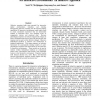390 search results - page 31 / 78 » A Model of Inductive Bias Learning |
UM
2007
Springer
14 years 2 months ago
2007
Springer
Accurately recognizing users’ affective states could contribute to more productive and enjoyable interactions, particularly for task-oriented learning environments. In addition t...
ICONIP
2004
13 years 10 months ago
2004
Abstract. This paper presents a neural-evolutionary framework for the simulation of market models in a bounded rationality scenario. Each agent involved in the scenario make use of...
AIIDE
2006
13 years 10 months ago
2006
Affective reasoning holds great potential for interactive digital entertainment, education, and training. Incorporating affective reasoning into the decision-making capabilities o...
KCAP
2009
ACM
14 years 3 months ago
2009
ACM
The POIROT project is a four-year effort to develop an architecture that integrates the products of a number of targeted reasoning and learning components to produce executable re...
INFOCOM
2006
IEEE
14 years 2 months ago
2006
IEEE
— Peer-to-peer systems are becoming increasingly popular, with millions of simultaneous users and a wide range of applications. Understanding existing systems and devising new pe...

